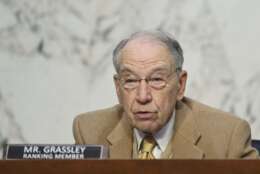Pay
-
The most serious discussions about possible changes to the federal pay and locality system are on hold, at least until the president nominates new members to the Federal Salary Council.
December 22, 2021 -
Over the years, an artificial pay cap has kept many GS-15s from getting some or all of the raises their subordinates got.
December 21, 2021 -
Every time there is a federal pay raise AND a cost of living adjustment for retirees, some folks figure they can get a piece of both. While it sounds good in theory, it isn't so simple.
December 16, 2021 -
The Pentagon says the mean increase of basic allowance for housing (BAH) will go up by 5.1%, a wide jump from the past two years, which have averaged just below 3%. DoD will spend $25.6 billion on BAH for 2022.
December 15, 2021 -
Outside of the blockbuster parts of the 2022 defense authorization bill, there are many new policies Congress will mandate the Pentagon to enact once the bill is signed into law.
December 08, 2021 -
A continuing resolution through February doesn't necessarily change the White House's plans for a federal pay raise for civilian employees next year. But while agencies have staved off another government shutdown threat for now, there's still plenty of dysfunction ahead.
December 06, 2021 -
The January cost of living adjustmnent for most retired feds, military and Social Security reciepents will be 5.9%. But the keyword is “most.”
November 16, 2021 -
Nonprofit contractors employing people with disabilities through the AbilityOne program have not been bound to pay minimum wages, with many employees consistently receiving sub-minimum wages.
October 27, 2021 -
There are also lots of things to consider, including picking the best health plan for you and yours to get you through 2022.
October 27, 2021 -
No, there hasn't been much progress on several pressing issues, including a need to secure full-year agency funding and avert (another) government shutdown, a deal with the debt ceiling (again) and a whole host of other legislative work.
October 25, 2021 -
The Federal Employees Retirement System (FERS) requires some-to-considerable thought and work from those who want to maximize their total retirement benefits.
October 21, 2021 -
The nine appropriations bills that Senate Democrats unveiled Monday are silent on the topic of federal pay, meaning they'll defer to the president's recommendation for a 2.7% raise for employees in 2022.
October 19, 2021 -
The Bureau of Alcohol, Tobacco, Firearms and Explosives misclassified more than 90 administrative positions as law enforcement jobs — and provided special premium pay typically reserved for criminal investigators and other officers to some employees.
October 14, 2021 -
The AbilityOne Commission, an independent federal agency, issued a proposed rule Tuesday that would bar federal contractors and subcontractors from paying a “subminimum wage” to workers who are blind, or have a physical or mental disability.
October 13, 2021 -
In today's Federal Newscast, Senator Chuck Grassley (R-Iowa) is looking into pay abuse at the law enforcement agency.
October 13, 2021















